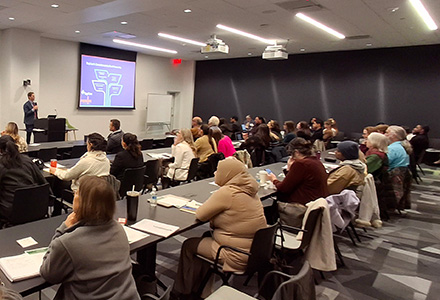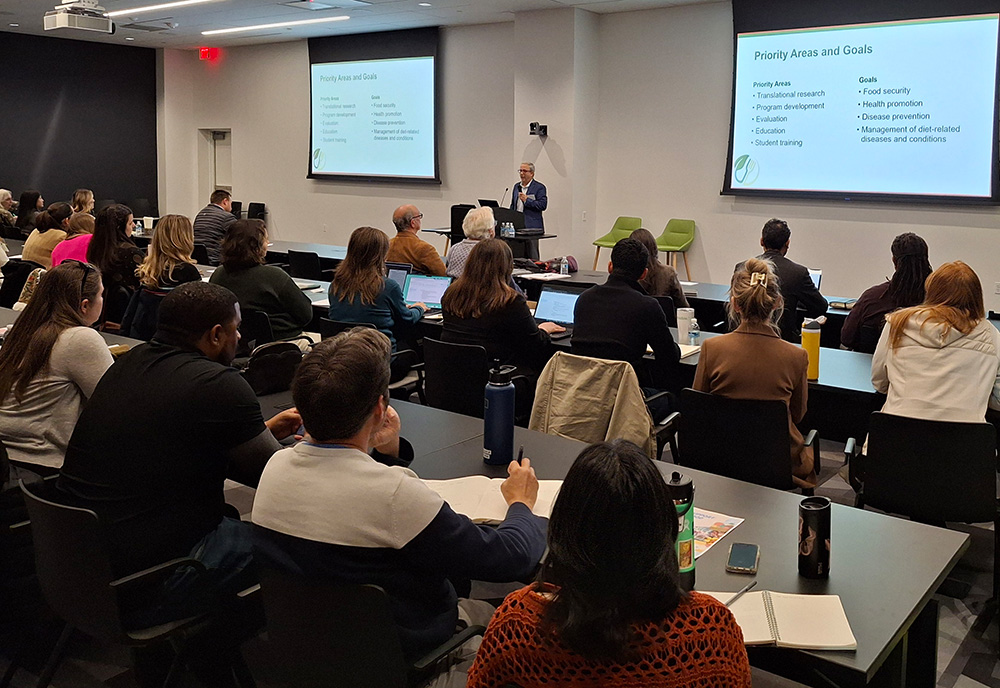By Emily Cedeño, USF Research Development Institute
The Future of Food Think Tank at the University of South Florida held its official launch in late January, convening a diverse group of researchers, health professionals and community leaders to tackle one of the most critical challenges of our time—food insecurity. The event served as a platform for thought leaders to discuss the far-reaching impacts of food insecurity on health, economic stability and sustainability, while emphasizing the need for innovative, interdisciplinary solutions.

Thomas Agrusti, senior community benefits analyst for Baycare Health Food Insecurity Programs, delivers a presentation.
“We recognize that one bag of groceries is not going to be enough; we need long- term solutions,” said Thomas Agrusti, senior community benefits analyst for Baycare Health Food Insecurity Programs and early community partner with the USF Future of Food Think Tank. Agrusti, like each participant coming to the launch event, understands the potential to scale the impact and efficiency of resources through a connected and integrated food system.
At its core, the Future of Food Think Tank aims to foster a dynamic university-community partnership equipped with the research, network and resources to reshape the food system in Tampa Bay and beyond. Central to this mission is ensuring all individuals have consistent access to safe, nutritious and culturally appropriate foods that support health and well-being. As food insecurity continues to rise, the think tank will work to create meaningful, research-driven solutions that bridge the gap between academic expertise and real-world application.
“Our vision is to cultivate a dynamic network that promotes resource sharing, interdisciplinary research and collaborative problem-solving,” explained David Himmelgreen, director of the USF Center for the Advancement of Food Security and Healthy Communities and one of the think tank’s faculty champions. “By bringing together diverse perspectives, we can develop innovative solutions that not only address food insecurity but also strengthen community resilience.”
Himmelgreen has been a longtime advocate for research-driven initiatives, emphasizing that solutions must be both evidence-based and community-informed. His approach highlights the need for sustainable models that are adaptable to the evolving challenges of food insecurity, particularly in the wake of the COVID-19 pandemic, which magnified existing disparities in food access.
His work aligns closely with local efforts led by Agrusti and Monica Petrella from Homegrown Hillsborough, both of whom were featured speakers at the think tank event. These leaders emphasized the importance of community-driven solutions, noting that food insecurity is not just about hunger—it is about economic opportunity, education and public health.
The Science Behind Food Security: The Role of Research
Christian Bréchot, fellow think tank champion and senior associate dean for research in global affairs at the Morsani College of Medicine, highlighted the groundbreaking research at the USF Microbiomes Institute—the only research center of its kind in Florida—as representative of the think tank’s capacity to be a resource and research engine toward understanding the foundations of food insecurity.
The research, spearheaded by a USF team led by Microbiome Institute Director Hariom Yadav, reveals a critical link between diet, microbiome health, and overall well-being. Their findings emphasize the urgent need to address nutritional security alongside food accessibility and reinforces the importance of viewing food insecurity as a public health issue rather than solely an economic or agricultural challenge.
Another pilot study conducted with USF students further illustrated these concerns, showing that food insecurity is linked to lower cognitive performance and a less diverse gut microbiome, highlighting the long-term consequences of inadequate nutrition. These findings underscore the profound impact of food access on both physical and mental health over time.
Bréchot emphasized that a key goal of the think tank is to integrate diverse fields of research into its mission, leveraging advancements in technology and science to drive meaningful progress in food security and public health. Through this collaborative approach, the think tank aims to develop innovative, evidence-based solutions that address the complex, multi-faceted nature of food insecurity and create a nimble ecosystem for translational impact in the community.
With a Vision Emerging, Next Steps Focus on Action
Each think tank working group—Education and Training, Partnerships and Economic Models, Novel Models of Agriculture, Human Health, and Social and Mental Health—will create action plans to guide the think tank’s mission moving forward. Bréchot and Himmelgreen announced a new working group dedicated to the future of emergency food response, after hosting a listening session in December with emergency response and food assistance providers to learn about their preparation, recovery and future resiliency planning after the region’s active Fall 2024 hurricane season.
Like the recent listening session, the Future of Food Think Tank aims to take its next convening into the community, where it will introduce these actions and take the next step toward its vision of an active university-community partnership dedicated to building a more resilient food system together.
Learn more, including announcements about future events, at the Future of Food Think Tank website or sign up to participate in a think tank working group.
